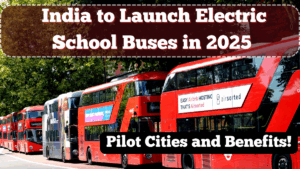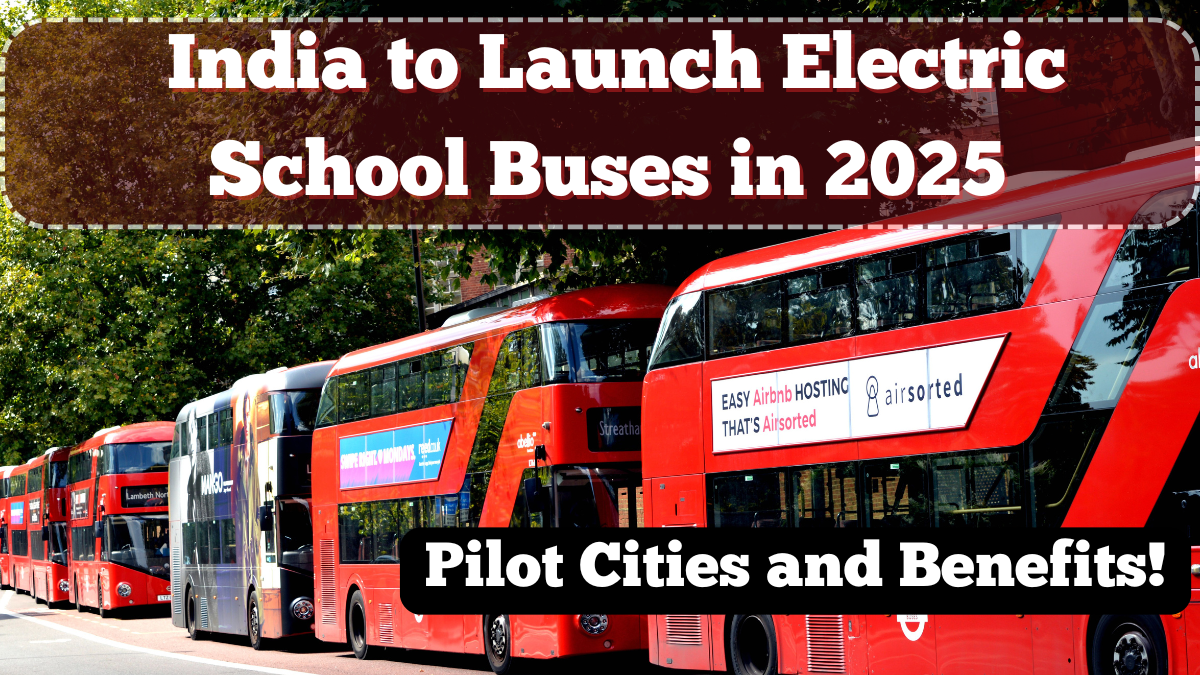The India’s EV school bus rollout 2025 marks a significant step toward eco-friendly transport for the country’s younger generation. In a bold and forward-thinking move, the Indian government has introduced electric school buses across select metro and tier-2 cities starting this year. This initiative is part of the broader clean mobility mission to cut emissions and provide a safer, quieter, and cleaner commute for schoolchildren.
With urban pollution levels rising and the need for sustainable transport growing urgent, these electric buses are being deployed under the Smart Mobility and Green Schools Mission. The program combines state government support, corporate CSR investment, and public-private partnerships to ensure scalability across India.
Let’s look into how this green transport plan is unfolding and where these buses are first hitting the roads.

Where Are the EV School Buses Being Rolled Out?
As part of India’s EV school bus rollout 2025, the following cities are part of the initial deployment phase:
| City | Number of EV School Buses | Launch Month |
|---|---|---|
| Delhi NCR | 100 | April 2025 |
| Mumbai | 75 | May 2025 |
| Bengaluru | 60 | June 2025 |
| Hyderabad | 50 | June 2025 |
| Pune | 40 | July 2025 |
| Ahmedabad | 30 | July 2025 |
These cities have been selected based on air quality data, school transport density, and the readiness of charging infrastructure.
This initial rollout under the EV buses India program is expected to impact over 200,000 students by the end of the academic year.
Key Features of the New Electric School Buses
The new EV fleet under India’s EV school bus rollout 2025 brings several advantages for children, parents, and the environment:
-
Zero tailpipe emissions – ensuring a cleaner and quieter school commute
-
Low-floor, easy-access design for young students and differently-abled children
-
Real-time GPS tracking for parents to monitor routes
-
Onboard CCTV and speed governors for improved safety
-
Fast-charging capabilities for daily usage in city conditions
These buses are equipped with advanced battery technology, allowing them to cover up to 200 km on a single charge – ideal for multiple school runs daily.
Who Is Supporting This Rollout?
The EV buses India project is supported by the Ministry of Education, Ministry of Transport, and the National Electric Mobility Mission Plan. Financial support also comes from:
-
FAME-II subsidy scheme
-
CSR funds from private automobile manufacturers
-
State green mobility programs
This rollout aligns with the larger green schools 2025 initiative, which aims to make school infrastructure eco-friendly through solar panels, rainwater harvesting, and now electric transport.
FAQs
Which cities are part of India’s EV school bus rollout 2025?
Cities like Delhi, Mumbai, Bengaluru, Hyderabad, Pune, and Ahmedabad are part of the initial phase of India’s EV school bus rollout 2025.
How will these buses help reduce pollution?
By replacing diesel-powered buses, EV buses India help reduce harmful emissions and lower urban air pollution significantly, especially near schools.
Who funds the electric school bus program in India?
The funding comes from government schemes like FAME-II, state support, and CSR contributions, forming a part of the green schools 2025 movement.
Are these electric buses safe for children?
Yes. They come with features like low-floor entry, GPS tracking, onboard CCTV, and speed limiters, making India’s EV school bus rollout 2025 child-friendly and secure.
What are the long-term goals of this program?
The long-term goal is to fully electrify school transport across Indian cities by 2030 under the clean energy movement, starting with pilot runs in 2025.
Click here to know more.
